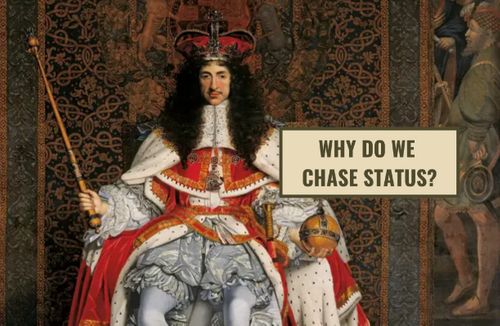Six types of status games
Oct 09, 2022 · 2 mins read
0
Share

Introduction. The phrase status-seeker can only be traced back to 1956, but seeking - and being anxious about - status is as old as humanity. What are the ways in which we chase status? In this Memo, I list 6. Further, I ask: What do we really chase when we chase status?👇
Save
Share
Status via beauty. Lip fillers, Instagram filters, nose jobs, and height extension surgery (men) are just some of the new strategies to win the oldest status game of all time: beauty. Beauty hints strongly at genetic fitness - which boosts odds of finding a suitable mate.
Save
Share
Status via brains. In The Mating Mind, Geoffrey Miller argues that the mind evolved its abilities to charm, be funny, create art, run complex hunts (and war campaigns and corporations) to look higher-status to potential mates. And so we paint, entertain, narrate, and create.
Save
Share
Status via brawns. From Olympic weightlifting to arm-wrestling, humans are very interested in looking brawny and gaining higher status. Sports test reaction times, athleticism, and more. Brawns demonstrate resilience against enemies, predators, and other threats.
Save
Share
Status via sacrifice. Gandhi, MLK Jr., Jesus Christ - all of them gained great status because they were willing to sacrifice their immediate interests for a greater good. This isn't to say sacrifices are only for status, but that status games can be positive-sum too.
Save
Share
The grisly logic of assassinations. The three men mentioned above have another commonality: they were all killed. If you can't personally become a great figure, you can atleast gain some notoriety and status by taking down a great figure - the dark rationale of assassinations.
Save
Share
Status via money. Forbes maintains a list of the richest people in the world, and we all care about the number in our bank account going up. Money implies optionality - and its a buffer against misfortune. To win the money game is to gain free time, free mobility, and more.
Save
Share
Status via costly beliefs. R. Henderson has pointed out that people today flaunt status via luxury beliefs: theoretically exotic but practically unworkable ideas. By the virtue of being costly, they confer status. Examples: non-binary genders, polygamy, and so on.
Save
Share
Status as hero worship. When we celebrate a high-status individual, are we not celebrating their excellence at something? Thomas Carlyle, a British historian, wrote that hero-worship is our deepest human instinct. And perhaps status is how we distill and measure heroism today.
Save
Share
Why do we chase status? Perhaps high status is how we get laid the most? Or perhaps because we need to exert, and we might as well exert upward? Because we feel a responsibility to our potential that, if fulfilled, leads to high status by default?
Why do you chase status?
Save
Share
0